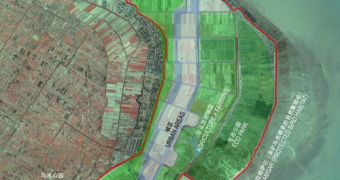Trying to face the extremely difficult dilemma of housing a predicted 1 billion people in urban environments by 2030, Chinese authorities in Beijing and Shanghai decided a few years ago to construct the country's first green city, a project that was to house some 500,000 people, with a minimal carbon footprint on their environment. Now, when the first residents were supposed to be moving in, the site looks gloomy, and there are now energy-efficient buildings to be seen anywhere.
The original plan included the construction of buildings that were situated low to the ground, and featured materials that insulated them, so as to keep heat and warmth inside, and to minimize power consumption. Wind turbines were to be installed in the streets, like lamp posts, and solar panels were also supposed to be a common sight.
Technology and design were at the heart of the project, and, if it had succeeded, it would have meant that China was right to follow an up-down political system, bent on creating some of the most massive structures in the world, in projects that were not cost-feasible.
But, according to recent images of the southern part of Chongming Island, where the community of Dongtan was to be erected, it now looks depressing, with rows and rows of small farms occupying the space of what should have been the fruit of a collaboration between the Chinese government and British construction firms. Former UK prime minister, Tony Blair, praised the project on several occasions, as did current UK prime minister, Gordon Brown, during a trip to Shanghai.
Some say that the failure of the Dongtan project is no surprise, because political interests are far too divergent to favor such a mass-scale construction. And while other regions of China, and even other nations, have adopted the idea of building eco-communities around major cities, this one will probably remain nothing more than a very expensive architectural design on a piece of paper, because, at this point, there is no political will to finalize Dongtan, and, without it, nothing can move in China.

 14 DAY TRIAL //
14 DAY TRIAL //